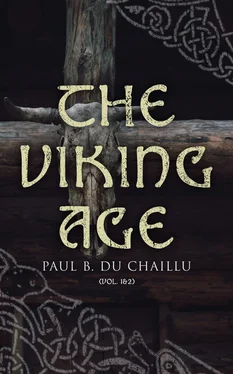Paul B. Du Chaillu - The Viking Age (Vol. 1&2)
Здесь есть возможность читать онлайн «Paul B. Du Chaillu - The Viking Age (Vol. 1&2)» — ознакомительный отрывок электронной книги совершенно бесплатно, а после прочтения отрывка купить полную версию. В некоторых случаях можно слушать аудио, скачать через торрент в формате fb2 и присутствует краткое содержание. Жанр: unrecognised, на английском языке. Описание произведения, (предисловие) а так же отзывы посетителей доступны на портале библиотеки ЛибКат.
- Название:The Viking Age (Vol. 1&2)
- Автор:
- Жанр:
- Год:неизвестен
- ISBN:нет данных
- Рейтинг книги:3 / 5. Голосов: 1
-
Избранное:Добавить в избранное
- Отзывы:
-
Ваша оценка:
- 60
- 1
- 2
- 3
- 4
- 5
The Viking Age (Vol. 1&2): краткое содержание, описание и аннотация
Предлагаем к чтению аннотацию, описание, краткое содержание или предисловие (зависит от того, что написал сам автор книги «The Viking Age (Vol. 1&2)»). Если вы не нашли необходимую информацию о книге — напишите в комментариях, мы постараемся отыскать её.
The Viking Age (Vol. 1&2) — читать онлайн ознакомительный отрывок
Ниже представлен текст книги, разбитый по страницам. Система сохранения места последней прочитанной страницы, позволяет с удобством читать онлайн бесплатно книгу «The Viking Age (Vol. 1&2)», без необходимости каждый раз заново искать на чём Вы остановились. Поставьте закладку, и сможете в любой момент перейти на страницу, на которой закончили чтение.
Интервал:
Закладка:
“King Olaf Tryggvason (995–1000) went to Thrandheim to christianize the bœndr; they agreed that he should go into their temple and observe their customs. He went into the temple, with a few of his men and some of the bœndr. They were all unarmed except the king, who had a staff ornamented with gold in his hand. As they entered there was no lack of carved idols: Thor sat in the middle, for he was most worshipped; he was large and ornamented all over with gold and silver; he sat in a splendid chariot, to which were harnessed two very well-made wooden he-goats. Both the chariot and the he-goats rested on wheels, and the rope around their horns was of twisted silver. All was made with wonderful skill” (Flateyjarbók i., p. 319).
Votive offerings of jewels and other valuable objects have been made in temples and churches in all lands and ages, and to this day the practice holds in some Roman and Greek Catholic countries.
The use of small images as amulets by the Northmen is shown by Kálf’s answer when asked by the King (Olaf Tryggvason) where Halfred was.
“ ‘He probably still adheres to his custom of sacrificing secretly; he has the image of Thor made of a tooth in his purse, and too little is told to thee, lord, about him, and thou canst not see how he really is.’ The King asked them to call Halfred that he might answer for himself. Halfred came. The King said, ‘Is it true of thee, that thou sacrificest?’ ‘It is not true, lord,’ answered Halfred; ‘now search my purse; here no trick is possible, even if I had wanted to use one.’ Nothing of the kind was found with him” (Olaf Tryggvason’s Saga).
“When King Olaf (Tryggvason) had been a short while in Thrandheim he heard a rumour that some men in Thrandheim still kept up heathendom, and that the idol of Frey stood there unbroken, and that those men who were there sacrificed to the idol. When he heard this he was displeased, and at the time he got these evil tidings he was at a feast. There were also some men from Thrandheim with him. He accused them of sacrificing to Frey as some witnesses had told him, and as they knew that they were not guiltless they did not deny it boldly, but would not acknowledge it. He said: ‘It will be seen how much of your words is true, and I will try it in this way—I command you to break the idol of Frey, to which I am told you sacrifice, and if you will not do that I believe that the accusation I bring against you is true.’ They answered: ‘We will not break the idol of Frey, for we have served him long, and it has helped us well.’ He said: ‘I and my men will break it though you forbid it.’ They answered: ‘Certainly we will forbid and hinder the destruction of Frey, though we expect that he will valiantly defend himself and help us if we follow him boldly, for he has more power than thou thinkest.’ He said: ‘This shall be tried. You shall defend Frey and I will attack him with God’s grace and the help of good men. Let him then defend himself if he is able. To-morrow we shall hold a Thing where I appoint. I will take Frey there and judge him boldly, and slay him, and do the good for you which God teaches me, if you will leave your false belief.’ They did not think this very advisable, but saw it had to be as the king wished. They went to their ships and rowed in the fjord and strove with both sails and oars. The luck of the king was stronger than the witchcraft of Frey and the evil belief of those who followed him, and therefore it happened as the best one (God) wished, and the king’s ship went much faster and he got first to the temple. When he came ashore his men saw some stud horses near the road which they said belonged to Frey. The king mounted a stallion and let others take the geldings, and they rode to the temple. He alighted from the stallion, went into the temple, and struck down the gods from their altars. Then he took Frey under his arm and carried him out to the horse, and shut up the temple. He rode with Frey to the meeting and came before those summoned. His land-tent was pitched, and he waited there. Now the men of Thrandheim came to the temple and opened it and went in. They saw that Frey had disappeared and the other gods were maimed, and they knew for certain that the king had caused this. They went to the meeting. When they had come there the king spoke mostly of things connected with the rule of the land and the laws. He then sent men to his tent and bad them carry Frey out, and when he was brought to the king the king took him and set him up and said: ‘Do you know this man?’ They answered: ‘We know him.’ ‘Who is he then?’ said the king. ‘One whom thou dost not know; he is Frey, our god.’ He said: ‘What good can Frey do, that you think it needful or a great necessity to believe in him?’ They answered: ‘We thought him very powerful until within a few years.’ ‘Why is he less powerful now?’ said the king. They answered: ‘Because he is now angry with us, which thou causest, for since thou didst tell us to believe in another god, and we partly followed thy persuasions, he thinks we have forsaken him, and therefore will not take any care of us.’ He then said, as if in mockery or jest: ‘It is unfortunate that Frey is angry with you, but in what way did he before show the power which you now miss?’ They answered: ‘He often spoke with us and foretold future things, and gave us good years and peace.’ He said: ‘I maintain that Frey has not spoken with you, but the devil himself.’ … He took a large axe and went to Frey, and said: ‘Now I will try, Frey, if thou canst talk and answer me.’ Frey was silent. ‘If thou,’ said the king, ‘canst not or wilt not, then may the one who is in thee, and has long strengthened thee, answer.’ … Frey was silent. The king said: ‘Still I speak to thee, Frey; if thou canst give to men strength or power, then spare it not, and do what thou art able to do, and if thou sleepest, awake and defend thee, for now I will attack thee.’ He raised his hand and cut off Frey’s hand, but he did not move. Then he struck one blow after the other until he had cut asunder the whole idol. …” (Flateyjarbók, I. Olaf Tryggvason).
The gods were not the only beings worshipped, for we have some examples of men being worshipped after their death.
“Olaf Geirstada-alf had a dream, at which he was much surprised, and which he would not tell when asked. He then summoned a Thing from all his realm, which was held at Geirstadir. The king asked the people to finish their cases, and afterwards he would make known why he had summoned them, as many might think that there was little reason for it. ‘I will tell my dream here,’ said he. ‘It seemed to me that a large black and fierce-looking bull entered the land from the east; it went about the whole realm. It seemed that so many men fell before its breath, that only half were left. Finally it killed my hird.’ He asked them to explain it, for he knew it must signify something. They answered that he himself could guess best what it meant. He added: ‘There have long been peace and good seasons in this kingdom, but many more people than it could sustain. The bull of which I dreamt is probably a foreboding of a sickness which will begin in the eastern part of this land, and cause many deaths. My hird will be attacked last, and it is most probable that I shall follow, for I cannot, more than others, survive my destined death-day. Now this dream is explained, and it will prove to be true. I advise the multitude here assembled to throw up a large mound out on the cape, and make a fence across it higher up, so that no cattle can go thither. Into the mound let every man of prominence put half a mark of silver to be buried with him. Before the disease ceases, I shall be placed in the mound. I warn all not to behave like some who worship by sacrifice, after their death, those in whom they trusted while alive, for I think dead men can do nothing useful. It may also happen that those who are worshipped will be suddenly bewitched. I think the same evil spirits ( vœttir ) sometimes do useful, sometimes harmful things. I fear much that a famine will come in the land after I have been mounded , and nevertheless we shall be worshipped and afterwards, bewitched in spite of ourselves.’ It happened as King Olaf said, and according to his explanation of the dream. The disease came before it was expected, many died, and all men of any prominence were laid in the mound; for King Olaf immediately sent men to make an exceedingly large mound, and the people made the fence according to his advice. It also happened that the hird died last and was mound laid . At last Olaf died, and was quickly laid among his men with much property and the mound was closed. Then fewer people died. Bad seasons and famine followed. It was then resolved to offer sacrifice to King Olaf for good seasons, and they called him Geirstada-alf” (Flateyjarbók ii. c. 6).
Читать дальшеИнтервал:
Закладка:
Похожие книги на «The Viking Age (Vol. 1&2)»
Представляем Вашему вниманию похожие книги на «The Viking Age (Vol. 1&2)» списком для выбора. Мы отобрали схожую по названию и смыслу литературу в надежде предоставить читателям больше вариантов отыскать новые, интересные, ещё непрочитанные произведения.
Обсуждение, отзывы о книге «The Viking Age (Vol. 1&2)» и просто собственные мнения читателей. Оставьте ваши комментарии, напишите, что Вы думаете о произведении, его смысле или главных героях. Укажите что конкретно понравилось, а что нет, и почему Вы так считаете.












